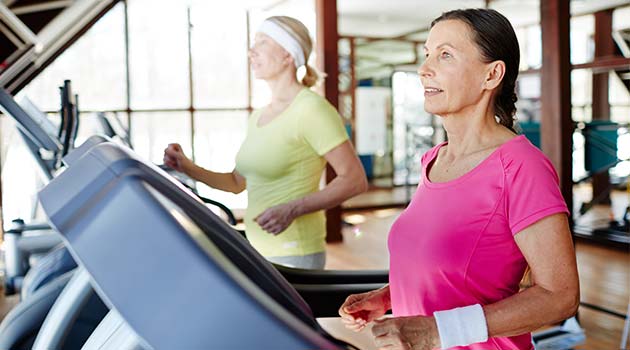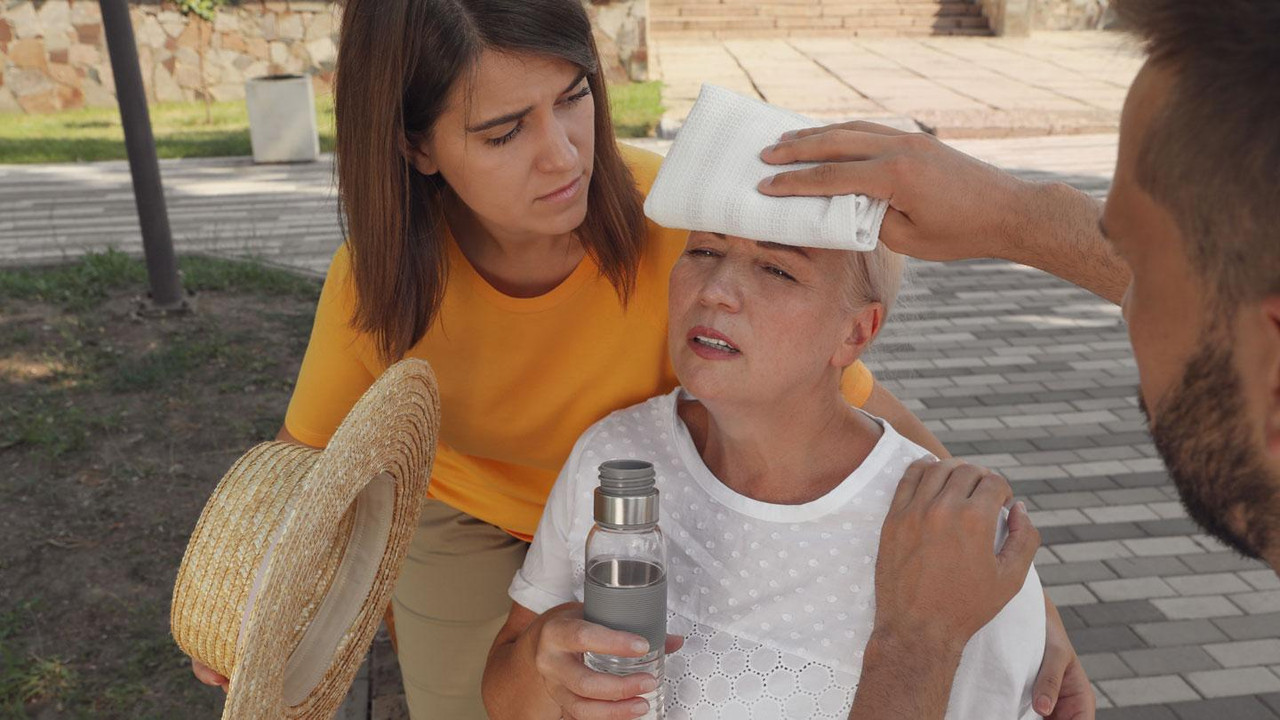For any woman, reaching 50 marks a significant turning point in her life. Still, if you're not leading a healthy lifestyle, you might already be starting to experience the consequences of aging. There are a few simple adjustments you can make to your routine to help you stay in shape and feel fantastic. Health Tips For Women Over 50 If you want to have a healthy and bright future, now is the time to start being more proactive about your health.
Take into account these eight suggestions if you're a woman over 50 and want to get healthier. It's critical to pay attention to the health and wellbeing of women over 50 during Women's History Month, as this is a time of life defined by substantial shifts, including menopause. The majority of women go through menopause between the ages of 45 and 55, according to the World Health Organization (WHO), which highlights the significance of accepting menopause as a normal aspect of aging.
A woman's quality of life may be impacted by the variety of physical, emotional, and mental changes that occur throughout this time. Here, we provide insightful health advice for women over 50 to help them face these changes with courage and understanding.
Health Tips For Women Over 50
Eat heart-healthy dietary items.
Women should prioritize their heart health as they get older. The American Heart Association reports that heart disease is the leading cause of death for American women. In fact, it claims the lives of more American women than the following three combined causes of death.
Leafy greens, whole grains, olive oil, avocados, almonds, low-fat dairy, and fish are examples of heart-healthy foods that you should include in your diet to help avoid heart disease and maintain the health of your heart and circulatory system.
Read also: Unwind & Unknot: 10 Yoga Poses to Melt Away Back Pain
2. Reduce your sodium intake.
Reducing your salt intake after the age of 50 is another crucial step toward better heart health. Your body can suffer greatly from too much salt in a number of ways. Consuming an excessive amount of salt can raise blood pressure, which increases your risk of heart attack, stroke, renal disease, and other avoidable illnesses.
Americans' excessive salt intake is primarily caused by fast food, frozen food, canned food, and salty snacks. Because most processed meals have a high salt content, it is best to avoid them.
Rather than just adding additional salt to your food, flavor it with herbs, citrus, or salsas. Consume more fresh fruits and vegetables.
3. Engage in daily exercise.
Daily 30-minute exercise is one of the best things you can do for your health. It helps with mood, energy levels, and sleep, in addition to increasing muscular tone and circulation. Strong bones are another benefit that postmenopausal women often worry about.
If it's been a while since you've been active, start out slowly by going for a daily stroll. When you are comfortable, you can progressively increase your speed or distance covered. For low-impact cardio, you might also think about including biking or swimming in your regimen.

4. Maintain Hydration
Regretfully, a large number of women do not consume the necessary amount of water each day. For women over fifty, there are many health advantages to drinking plenty of water. These include promoting healthy cell division and growth, lubricating joints, and supporting vital physiological processes like digestion and circulation.
Water also aids the body's detoxification process. Try keeping a water bottle with you and taking little breaks throughout the day if you discover that you're getting dehydrated by the end of the day. It might have a big impact on your general well-being.
5. Increase your dietary calcium intake.
Decreased bone strength and density are often concerns for women going through menopause. Even though it is an unavoidable aspect of life, there are solutions available to address this issue. Increasing your calcium intake can help your bones remain strong after you cross the 50-year mark.
To prevent brittle bones, you can take a calcium supplement or include a variety of foods and beverages that are fortified with calcium in your diet. Ask your doctor how much calcium is best for you each day.
6. Make sure you get enough rest.
According to the National Sleep Foundation, one in four women over 65 suffers from sleep apnea, and the condition worsens in women over the age of 50.
This may be related to the fact that hormonal changes around this age lower progesterone, which increases the risk for this sleep condition, and menopause can increase belly fat. Health Tips For Women Over 50 Because of this risk, women over 50 should prioritize maintaining healthy sleep habits and getting enough rest.
If you've discovered that your sleep quality has declined, see a healthcare provider to identify the underlying cause of the problem. Increased blood pressure and cardiovascular illness are potential consequences of untreated sleep apnea.
Read also: 11 Reasons Why You Should Date a Woman Who Loves to Workout
7. It's Still Possible to Give Up Smoking
It may seem too late to quit smoking if you've done so for a long time. In reality, it's never too late to quit smoking. Any age smoker could benefit from giving up. Your risk of lung illness, heart disease, high blood pressure, poor circulation, and all other conditions associated with smoking and long-term nicotine use will be significantly reduced. Quitting permanently is hard, but it's best for your future.
8. For prevention, schedule frequent screenings.
Being aware of your current health status is essential to maintaining excellent health. Mammograms, virtual colonoscopies, heart scans, lung scans, and other preventative screenings can assist in diagnosing problems before they worsen. Preventative scans are a wonderful idea for women over 50, as their risk of certain diseases and ailments can increase. When you always take care of your health, you will live your best life.
9. The Menopause and Its Impact on Women's Health
Understanding menopause and its effects is critical to identifying the changes that women go through throughout this important stage of life. For women, menopause denotes the end of their reproductive years and monthly periods.
The main causes of this transition are a decrease in estrogen levels, a crucial hormone for the female reproductive system, and ovarian function.
Symptoms and changes in the body
Many physical health issues might result from the menopausal drop in estrogen levels:
- Night sweats and hot flashes: Abrupt sensations of warmth, which are usually strongest across the face, neck, and chest, can be uncomfortable and interfere with everyday tasks and sleep.
- Denoporosis: Reduced estrogen levels raise the risk of fractures and osteoporosis by causing a decrease in bone density.
- Diseases of the Heart: After menopause, estrogen's heart-protective effects fade, increasing the chance of cardiovascular diseases such as heart disease and stroke.
Impacts on Emotional and Mental Health
Additionally, menopause can have a significant impact on mental and emotional well-being.
- Mood Shifts: Hormone fluctuations can cause mood swings, impatience, and a greater vulnerability to stress and anxiety.
- Feeling Down: Women may be more susceptible to depression during the menopause transition because of hormonal fluctuations, sleep issues, and other menopause-related symptoms.
- Changes in Cognitive: Menopause-related memory and attention problems are reported by some women, while stress and disturbed sleep can also have an impact on these symptoms.
Impacts on Society and Lifestyle
The menopause shift can have an effect on a woman's social life and relationships with other people. Mood and confidence can be affected by changes in the way you look.
Like gaining weight or having your face change, as well as problems with your emotional and mental health. Additionally, signs such as a low libido and a dry vagina can impact sexual health and intimacy, which could lead to problems in romantic relationships.
Higher health risks
The decrease in estrogen levels that occurs during menopause is another important piece of advice for women over fifty. In addition to causing unpleasant symptoms, this raises the possibility of a number of dangerous medical disorders.
Because estrogen helps to maintain bone density, osteoporosis—a disorder that weakens bones and increases the risk of fractures—becomes more of an issue after menopause.
In a similar vein, cardiovascular disease risk increases after menopause. A decrease in estrogen can raise the risk of heart disease and stroke since it is thought to have a protective impact on the heart and blood vessels.

Giving Women Over 50's Mental and Physical Health Priority
Taking care of noncommunicable illnesses (NCDs) like cancer, diabetes, and heart disease is another important health recommendation for women over 50.
Significant health risks associated with these disorders can be reduced with preventative care, such as routine screenings and lifestyle modifications.
Key tactics for preserving physical health and preventing NCDs include eating a balanced diet, getting regular exercise, and abstaining from dangerous behaviors like smoking and binge drinking.
Read also: How Does a Walk on a Treadmill Compare to a Walk Outdoors?
Internal health matters to take into account
Equal focus should be paid to mental health, particularly since women are more likely than men to experience certain illnesses during this period of life, such as anxiety and depression.
It's critical that women who are experiencing mental health problems get help, and that medical professionals watch out for symptoms of mental illness in their patients. Among the methods for promoting mental wellness are:
- Therapy & Counseling: Women who are navigating the emotional obstacles of menopause and aging can benefit from professional support.
- Manage Stress: Methods like yoga, meditation, and mindfulness help lower stress and enhance mental health.
- Social Assistance: Keeping up solid social ties helps lessen feelings of loneliness and offer emotional support.
FAQ's: Health Tips For Women Over 50
How to get healthy at 50 females?
- Eat healthy—use the MyPlate Plan to get started.
- Get at least 30 minutes of physical activity.
- Get at least 7 to 9 hours of sleep.
- Reach and maintain a healthy weight.
- Get help to quit or not start smoking.
- Limit alcohol use to 1 drink or less.
- Not use illegal drugs or misuse prescription drugs.
What should a 50 year old woman do?
- Consume heart-healthy food. As women age, a focus on heart health should become a top priority.
- Cut Back on Sodium.
- Exercise daily.
- Stay Hydrated.
- Add More Calcium to Your Diet.
- Make Sure You Get Enough Sleep.
- It's Not Too Late to Quit Smoking.
- Get Regular Preventative Screenings.
What happens to a woman turning 50 years old?
By the time they are 50 or older, many women are more thankful for each day, more sure of their choices, and better able to decide how to spend their time. But experts say that around age 50, aging starts to show in your body and cause changes that you might not have expected.
How to slow aging at 50?
Genetic and social factors work together in a complicated way to cause aging. Aging can't be totally stopped, but it can be slowed. Getting enough sleep, keeping optimal sex hormone levels, eating a diet rich in plants, and staying physically active all support healthy aging.
Is 50 considered old for a woman?
Consider yourself young until you hit age 60 (male) or 65 (female), then middle-aged until age 75 (male) or 80 (female). See, you're much more young than you thought!
At what age do you start feeling tired and old?
Well, this varies on a person's age, health, fitness level and lifestyle. Generally, the more years that pass, the more you'll value your beauty sleep, and its true senior tiredness is a real thing. However, most people start experiencing a decline in their energy levels by the time they hit their mid-thirties.
